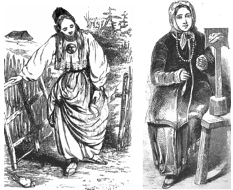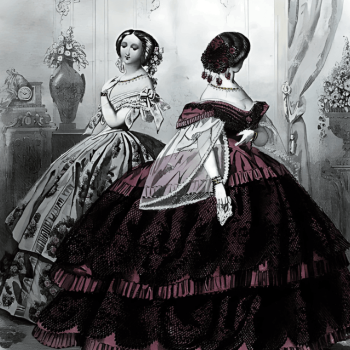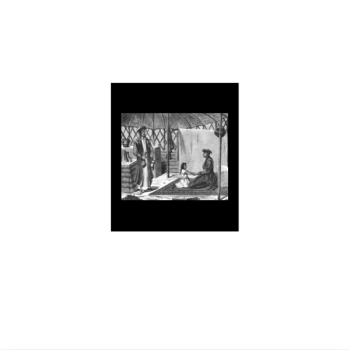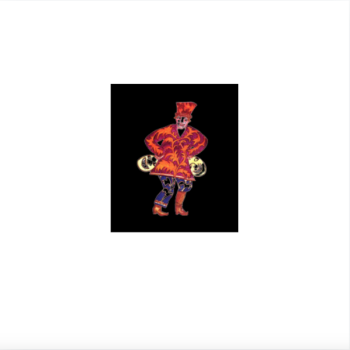DASHA & DUNYA
Winter 1840.
Vera was playing with two “yard girls” her age, Dasha and Dunya. From remote antiquity, since the origin of the servitude of the peasants, Russian nobility divided the serfs on their estates into two classes—into cultivators and the dwornije ljudi (court-yard people) whom they selected as fittest for their family’s personal service.[1] (It was the latter class to which Dasha and Dunya belonged.) They began by placing a wicker chair in a sunny place which they called the “shiny circles” that formed on the floor under it grapes. Dunya, a simple, kind girl, played the part of gardener, and Vera came to buy grapes. The lively Dasha, a very smart and cunning girl, represented the thief. She pulled the chair into the shadow so that the circles disappeared, which meant that the thief had stolen the grapes, and rushed to run away. Vera and Dunya would run after her until she was caught. It was a very stupid game, but it amused them.

Russian Peasant Girls.[2]
“Listen, Verochka, get ready, let’s go,” said Baba Lena, entering the room, “I am going to take you to a house today where there are many, many girls.
“Where is it, Baba Lena? To the Grechinskys or Beketovs?”
“No, you have never been to this house before. Many little girls live and study there. We will bring them sweets and gingerbread—you will have fun with them.”
“She is going to take you to the shelter!” whispered Dasha.
“What is this—a shelter?” Vera asked.
“It is a school for poor, ordinary children. All the girls there are just like us—perhaps even worse than us! I don’t know why you go there. It would be better if you played with us.”
Vera did not quite understand the meaning of her words and suggested they continue to play. Vera and Dunya continued running after Dasha until, finally tired, settled down to rest on the carpet.
“Those orphans are happy, really!” said Dasha, who was the first to break the silence. She threw her thick, blonde braids over her shoulders and fanned her flushed face with five fingers. “If they want to sleep, they sleep! If they want to play, they play! If they want to eat, they eat! There is no need to die!”
“Don’t you play, sleep and eat?” Vera asked.
“When they allow me to, I eat and sleep, but if they don’t give permission, I don’t. You see, you are always allowed, for you are a young lady!”
“I would like to be a young lady too!” said Dunya drawlingly.
“Look! Who wouldn’t want to be a young lady?” said Dasha. “If you and I were young ladies, the world would be a fine place for us to live in!”
“Yes! There would be no need to learn how to knit stockings,” Dunya again interrupted. “Everyone would play and eat.”
“Well, what about your own stockings?” Vera asked. “It’s worse for us—we have so much to study! And read, and write, and in French, and play the piano, and—”
“And, and, and, and, and…” said Dasha. “Those things are fun! I would be so glad to learn such things!”
“I would not do anything!” said Dunya shaking her head. “You have to study so much!”
“Yes,” said Vera in agreement. “What is so hard about knitting stockings? It is simple! It’s dreadful how much they require us to know!”
“But you won’t know about all of this!” teased Dasha.
“How can I not?” said Vera. “I already know a lot—”
“—Well, what do you know?” interrupted Dasha unceremoniously. “I know how to knit a stocking, but you don’t even know how to do that.”
“Why do I need a stocking?” Vera protested. “I have to learn to read! And you don’t know how to read!”
“Well show me all the things you know! Tell me what you know that I do not. Go on, tell me! Shall I ask questions? Where does the sun rise at dawn? Where does it hide in the evening? Why does it burn when you touch fire? Where does snow and rain come from? Why is the grass green? Why are flowers colorful? Who paints them, huh? Well, tell me! Answer everything I ask. You see, you don’t know as much as you think you do! That’s a shame, really, for not only do you not know anything more than me, you don’t even know how to knit!”
Vera was going to answer Dasha very angrily because she was very well aware of the truth in her questioner’s words. Just as she was about to respond, Nanny Nastya entered the room with her fur coat and bonnet. Dasha immediately fell silent and became subdued. She was indeed cunning, and always kept quiet in front of her elders. Vera gave her an angry look but was very glad that Nanny Nastya’s arrival rescued her from the doomed argument. Vera went with Baba Lena, but she was in a very introspective mood.
“Yes,” Vera thought, “I need to know a lot. I need to learn a lot. It’s not good to not be able to answer anything. Dasha asks ‘Why does the sun shine?’ or ‘Where do the snow and rain come from?’ But I don’t even know!” She began to look at the snowflakes that were spinning in the air and landing on her dark fur coat. “What glorious snow!” she thought. “The fall in lovely star shapes…and every one of them unique.” “Butterfly,” she asked, “why does the snow fall like such pretty stars? How are they made?”
“God makes them like this,” answered Baba Lena. “He created everything in nature well and beautifully.”
“What is this — nature?”
“Nature is everything that exists in the world of God. The snow, rivers, mountains, forests—in summer the grass and flowers. The sun and the months, everything that we see around us, it is all nature, my child.”
“Butterfly, tell me, how does the sun rise and go down? And why is it warm in the summer, and greenery and flowers everywhere, but when it is winter it is cold snowy? Why does the sun burn so brightly?”
“What has gotten into that head of yours?” said Baba Lena. “It’s hard to explain all of this to such a little girl. When you grow up, you will study, and you will learn a lot. For now, it is enough for you to know that all of this was created by the Lord God, who created us people and ordered us to use all of nature so that we would not need anything. He arranged it in such a way that for half of the year, the sun remains in the sky longer, and warms the earth hotter. As a result, the snow melts, and the grass grows, the fruits ripen on the trees, everything turns green and blooms in the forests, and bread ripens in the fields. Rye, wheat, everything that grows for our food and pleasure. This half of the year is called summer when there are long, hot days and short nights. The other half of the year the sun rises later and lower in the sky, hides much earlier, and hardly warms the earth. There it is now—do you see how low it stands?” she said, pointing Vera in the direction where the sun hovered almost above the roofs of the houses. It was red, but not hot, and shined without rays. Vera could easily look upon it without squinting. “That’s why in winter the days are short, the nights are long, and there is cold and frost.”
“Well, where does the snow come from?” Vetra interrupted.
“Don’t you know that water freezes because of the cold? Look at the Volga. In summer the water flows in it, and the boats float. Now people ride on it in carts and sleighs and walk on foot as if they were on the ground because it is covered with a thick layer of ice. Well, because of the cold, those drops of water that would fall to the ground as rain in summer, freeze in the air and fall on it as snowflakes in winter. The cold does not allow them to melt, so many, many such snowflakes, compacted on the ground, cover it like a white blanket. Snow is frozen rain, my child.”
“Why are all the snowflakes so patterned?” Vera interrupted. “Raindrops are just drops, but snowflakes look at the stars.”
“Well, my dear, this cannot be explained!” answered Baba Lena with a smile. “The one who carves leaves on trees, who paints the flowers and different perfume, also carves these snowy stars. Do you know who does this?”
“God!” answered Vera very quietly.
“Yes, my dear,” said Baba Lena. “A wise and kind God, who has arranged everything in the world beautifully and usefully.”
“But Butterfly, what about the winter useful? It would be better if it were always summer, so flowers, berries, and fruits could always grow! It’s not good that God made a cold winter.”
“No, my child. Everything that God created is good. He is smarter and kinder than you and I. The earth also needs rest, just as we humans need sleep at night. In winter, the earth sleeps under its fluffy, snowy cover. She gains strength for the summer so that when the sun warms her in the spring, the snow melts. Then the warm rain can flow deep into the earth, and water the grass and roots of trees. To be ready to give a person everything they may need from her. Then she will release vegetables, ears of corn, and berries—everything that she had prepared throughout the long winter inside herself, under her blanket of snow. And we people will collect all this, prepare bread and vegetables, feast on berries and fruits, and make jam for the winter so that even then we are provided for. After she has given us everything, she will rest. And as we gather and eat, we will thank God, who created all this for us, who arranged everything so well and so wisely.”
“What does this mean—wisely?”
“Wisely means very smart. Now you are not very wise, because you are very small. When you grow up and learn everything, you will be wise.”
“No, Butterfly. It seems like I will never be smart. To be smart, you need to study so much, know so much.”
“It’s not very difficult, my child! You just have to be willing to learn—and you will learn everything you want. Here we are, come now. Let’s see how the smart girls study here.”[3]
-
- MOTHERS & DAUGHTERS
- A LANTERN
- CHRISTENING OF THE DOLL
- DASHA & DUNYA
- GRUNYA
- NANNY NASTYA
- NANNY’S FAIRYTALE
- CONFESSION
- IN THE MONASTERY
- PREPARATIONS FOR THE HOLIDAY
- EASTER
- THE DACHA
- THE MELON POND
- MIKHAIL IVANOVICH
- THE WARLIKE PARTRIDGE
- LEONID
- NEW WINTER
- HISTORY OF BELYANKA
- THEATRES AND BALLS
- YOLKA
- REASONING
- ROAD
- CAMP
- IN NEW PLACES
- THE GRAY MONK
- VARENIKI
- THE TRIP TO DIKANKA
- WHAT HAPPENED IN THE DOLL HOUSE
- ANTONIA’S STORY
- “A WINTER EVENING”
- THE BLACK SEA
- CRIME AND PUNISHMENT
- PANIKHIDA
- PRINCE TYUMEN
SOURCES:
[1] Kohl, J. G. Russia And The Russians In 1842. Carey And Hart. Philadelphia, Pennsylvania. (1843):140.
[2] Knox, Thomas W. The Boy Travellers In The Russian Empire. Harper & Brothers. New York, New York. (1887): 120, 204.
[3] Zhelihovskaya, Vera Petrovna. How I Was Little. A. F. Devrien. St. Petersburg, Russia. (1898): 25-32.













